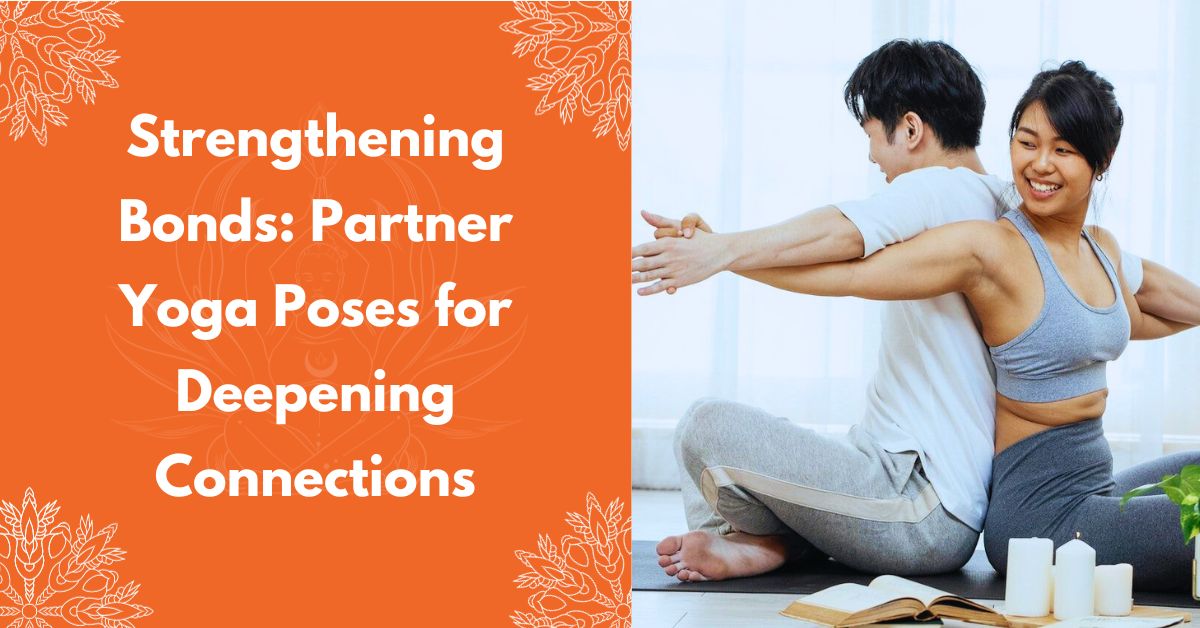
Strengthening Bonds: Partner Yoga Poses for Deepening Connections
🤝 Elevate your yoga practice with Partner Yoga Poses! From beginner-friendly stretches to advanced balances, deepen your connections and strengthen bonds. Trust, communicate, and unite through yoga! 🧘♂️🧘♀️ #PartnerYoga #YogaConnection 🌟
Introduction to Partner Yoga
Partner yoga involves practicing yoga postures with a partner. It combines the benefits of traditional yoga, such as improved flexibility and relaxation, with the added bonus of human connection. Practicing yoga with a partner adds an element of trust and teamwork, making it a deeply enriching experience.
Benefits of Partner Yoga
Partner yoga offers a wide array of benefits, both physically and emotionally. It encourages mutual support, enhances communication, and promotes a sense of unity. Physically, it allows partners to explore deeper stretches and poses that might be challenging in individual practice.
Building Trust and Communication
Trust-building Poses
One partner can support the other in balancing poses, creating a sense of trust and reliance. Poses like the Trust Lean require one partner to lean backward, trusting the other to support their weight.

Communicative Poses
Poses like the Mirror Pose involve partners mirroring each other’s movements, fostering non-verbal communication and synchronization. This creates a profound sense of connection and harmony.
Strengthening Physical Intimacy
Heart-Opening Poses
Heart-opening poses, such as the Partner Camel Pose, involve partners facing each other, creating a heart-to-heart connection. These poses enhance emotional intimacy and openness.

Balance-enhancing Poses
Balancing poses like the Double Tree Pose require partners to work together to maintain stability. This mutual effort strengthens both physical and emotional balance.
Beginner-Friendly Partner Yoga Poses
Partner Seated Forward Bend
Sit facing your partner with your legs spread wide apart. Reach out and hold each other’s hands. As you exhale, gently lean forward, keeping your back straight. Your partner will lean back, creating a counterbalance. Hold the pose for a few breaths and then release.
Back-to-Back Chair Pose
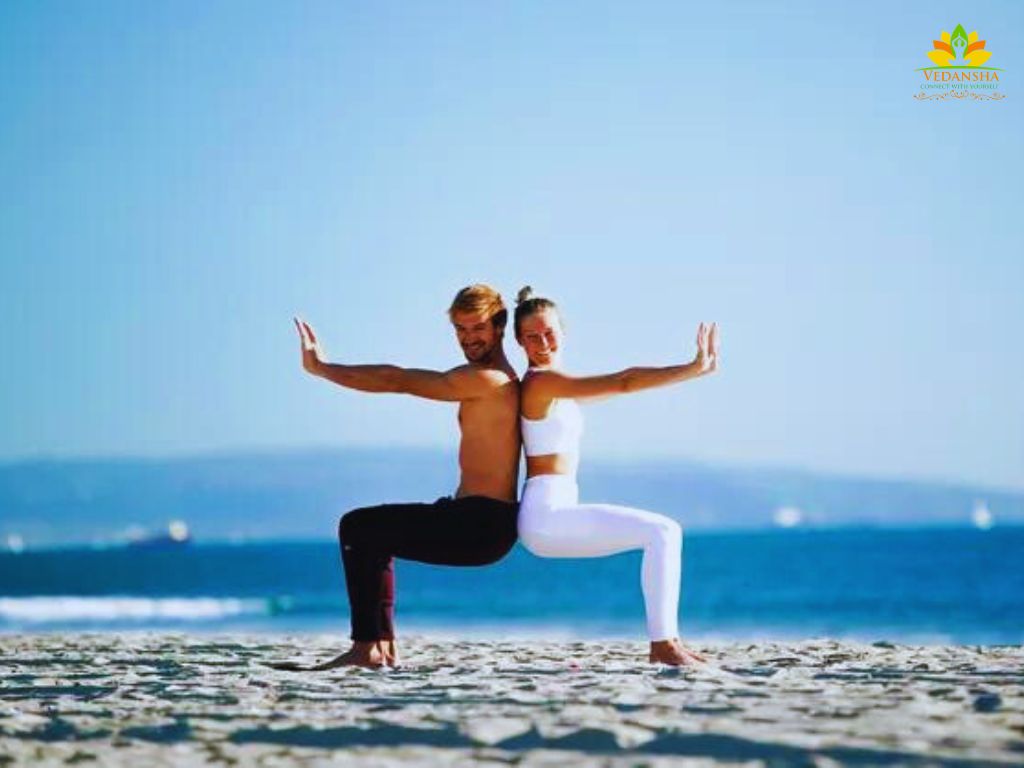
Stand back-to-back with your partner. Both partners should bend their knees and lower into a seated position, as if sitting in an imaginary chair. Press your backs against each other for support. Hold the pose for a minute while breathing deeply.
Partner Child’s Pose
One partner sits in a Child’s Pose (kneeling with the forehead on the ground and arms stretched out in front), while the other partner sits on their lower back, facing away. The seated partner can gently lean back, allowing for a gentle stretch in the back and shoulders.
Partner Twist
Sit facing each other with your legs crossed. Reach out and hold your partner’s hands. Inhale deeply, and as you exhale, twist your torso to one side while your partner twists in the opposite direction. Use each other’s resistance to deepen the stretch.
Partner Tree Pose
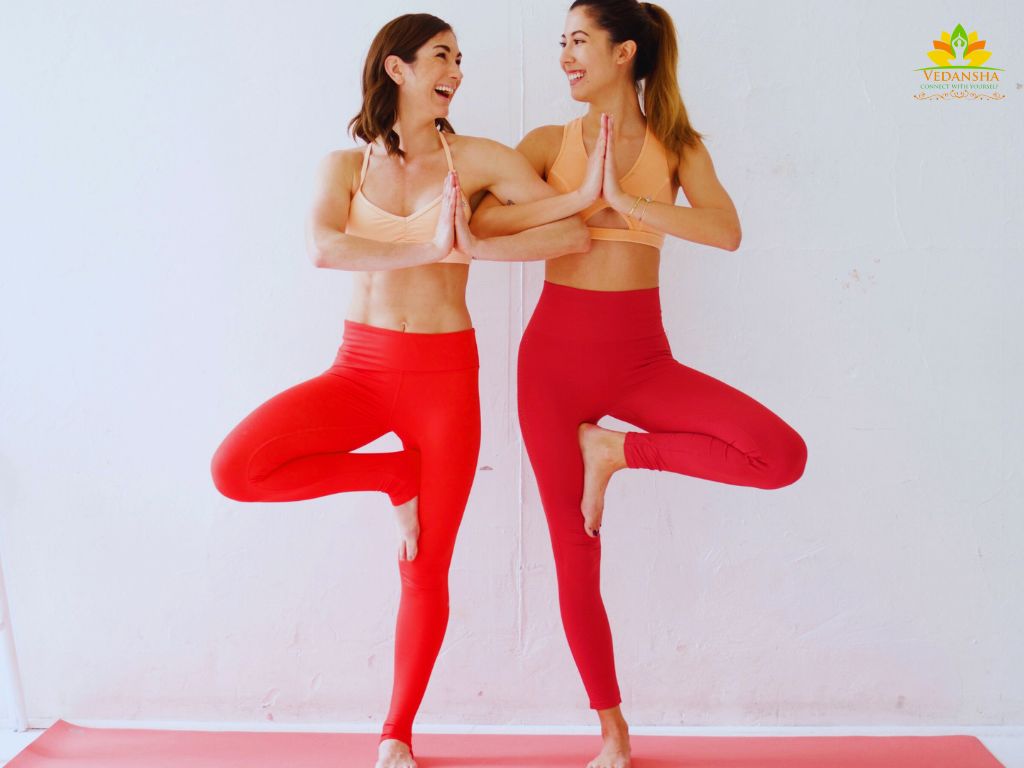
Stand facing your partner and hold their hand for balance. Lift one foot and place it on your inner thigh or calf, avoiding the knee. Find a focal point to help with balance. If you both feel stable, you can raise your outer hands and touch palms above your heads.
Double Downward Dog
Both partners get into a Downward Dog position, facing each other with a comfortable distance between you. Reach out and hold each other’s hands. Press your hips back and straighten your legs, creating an inverted V shape. Use each other’s support to elongate the spine and deepen the stretch.
Challenging Partner Yoga Poses for Advanced Practitioners
AcroYoga Throne Pose
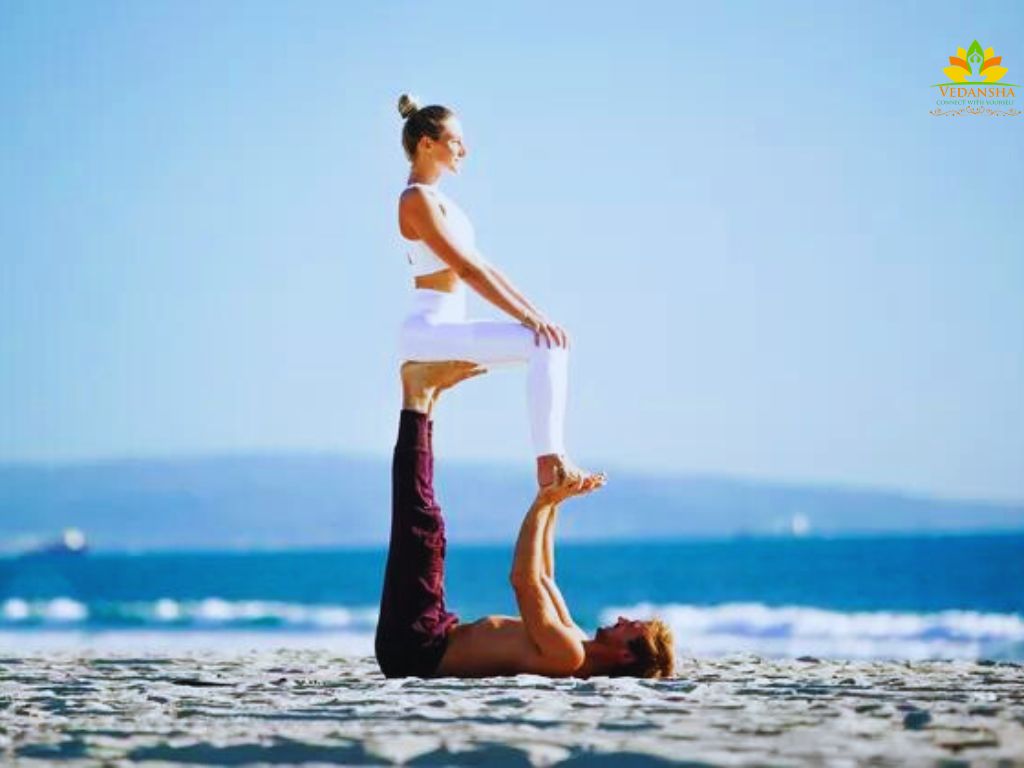
In this pose, the base partner sits with their knees bent and feet flat on the ground, creating a “throne.” The flyer partner sits on the base’s feet, facing away. The flyer then leans back, supported by the base’s hands. This pose demands balance, core strength, and trust.
Double Plank Pose
Both partners start in a plank position facing each other, with their palms flat on the ground. Partners inch closer until their toes touch. This pose requires intense core strength, balance, and synchronization to maintain the plank position together.
Suspended Split Pose
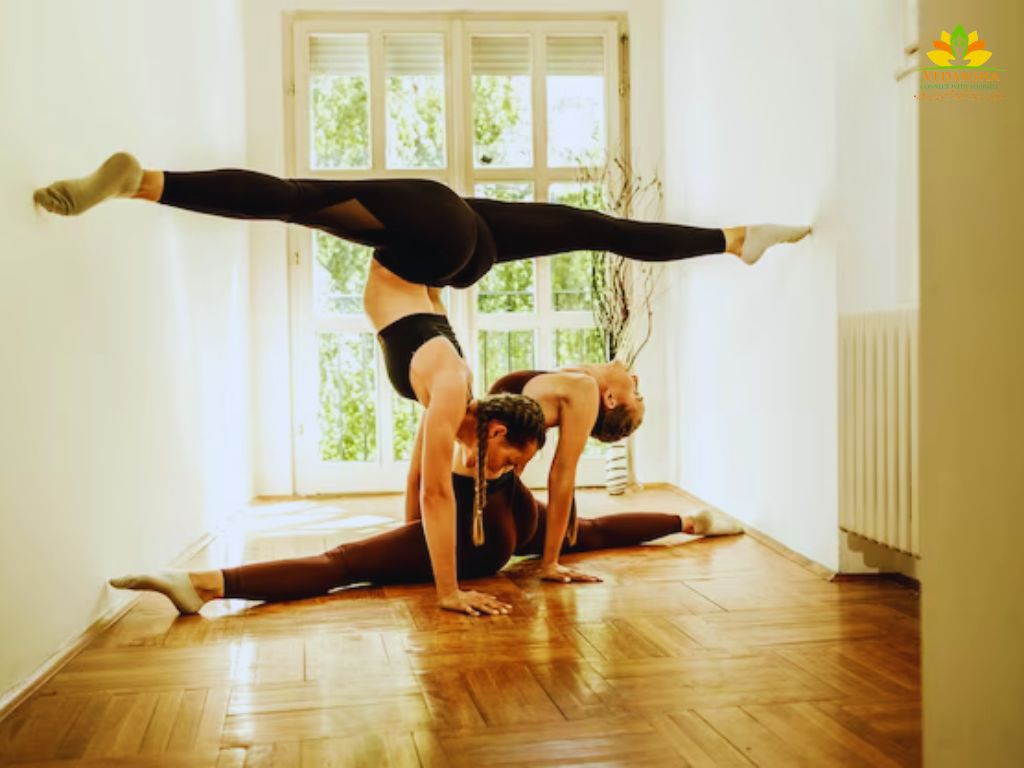
The base partner lies on their back with one leg extended straight up. The flyer partner stands facing the base, placing one foot on the base’s raised foot. The flyer then extends their other leg into a split position. Balance, flexibility, and coordination are all put to the test by this.
Flying Pigeon Pose
The base partner lies on their back with their legs lifted in the air. The flyer partner balances on one of the base’s feet, assuming the pigeon pose with the other leg extended straight back. This pose demands hip flexibility, core strength, and stability.
Partner Wheel Pose
Both partners lie on their backs, feet hip-width apart, and knees bent. Partners reach out and clasp each other’s hands, forming a circle. Simultaneously, partners push into the ground and lift their hips, creating a wheel shape. This pose requires backbend flexibility, shoulder strength, and mutual support.
Overcoming Challenges Together
Partner yoga teaches partners to face challenges as a team. Whether it’s mastering a difficult pose or finding balance, overcoming these challenges together strengthens the bond between partners.

1. Celebrating Small Victories
In partner yoga, every achievement, no matter how small, is a victory. Celebrating these victories – mastering a difficult pose, holding a position longer, or deepening a stretch – strengthens the sense of accomplishment and encourages partners to face more significant challenges together.
2. Learning from Setbacks

Setbacks are natural in partner yoga. Perhaps a pose isn’t achieved on the first attempt, or balance falters. These setbacks are invaluable teachers, offering lessons in resilience and adaptability. Partners learn to analyze the situation, adjust their approach, and try again, applying these problem-solving skills to life’s challenges.
3. Strengthening the Emotional Connection
Overcoming challenges in partner yoga is an emotional journey. Partners share moments of frustration, determination, and success, deepening their emotional connection. The shared experience of triumphing over challenges creates a profound sense of unity and understanding.
4. Cultivating Gratitude
Partner yoga challenges remind partners of the importance of gratitude. Gratitude for their bodies, for their partner’s support, and for the opportunity to learn and grow together. This gratitude strengthens the partnership, fostering a positive and appreciative mindset.

Fostering Emotional Support
Poses for Emotional Release
Certain partner poses, like the Supported Backbend, allow partners to release pent-up emotions. The support of a partner provides a safe space for emotional expression and catharsis.
Poses for Stress Relief
Partner yoga also includes restorative poses, such as the Partner Child’s Pose, which promote relaxation and stress relief. These poses help partners unwind together, fostering emotional support and tranquility.

Partner Yoga for Families and Friends
Partner yoga isn’t limited to romantic partners; it can also be practiced with family members and friends. Group poses like the Circle of Trust enhance the sense of community and shared experience.
Partner Yoga Retreats: A Unique Bonding Experience
Participating in a partner yoga retreat offers an immersive experience. Surrounded by nature and like-minded individuals, couples and friends can deepen their connections while enjoying the benefits of yoga and meditation.
Conclusion
Partner yoga goes beyond physical movements; it’s a shared journey of trust and understanding. By practicing together, individuals not only enhance their physical flexibility but also build emotional bonds. It’s more than just poses; it’s a way to nurture relationships, making them stronger, more resilient, and filled with love and care.
FAQs
1. Can partner yoga be practiced by people of all ages?
Yes, partner yoga can be adapted for individuals of all ages and fitness levels, making it inclusive for everyone.
2. Do I need prior yoga experience to practice partner yoga?
While prior yoga experience is helpful, beginners can start with simple poses and gradually progress to more advanced ones with the guidance of experienced partners or instructors.
3. Can partner yoga be practiced outdoors?
Absolutely! Partner yoga can be practiced indoors or outdoors, and practicing in nature can enhance the overall experience.
4. What should I wear for partner yoga?
Wear comfortable, stretchy clothing that allows for ease of movement. Avoid clothes with zippers or buttons to prevent discomfort during partner poses.
5. How long should partner yoga sessions typically last?
Partner yoga sessions can vary in length, but starting with 30 to 60 minutes allows enough time to explore different poses and enjoy the practice.

